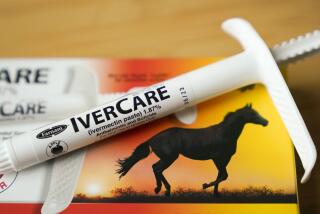No Relief in the Pain Relief Wars
- Share via
Raising the stakes in what is shaping up as the most vicious advertising battle in memory, Advil on Thursday published a dramatic open letter from a man who experienced liver failure after taking Tylenol.
The letter, which appeared in the Los Angeles Times, USA Today and several other U.S. newspapers, represents the latest round in the running battle between the nation’s top two analgesic brands. It says that Tylenol poses potentially devastating health risks to regular drinkers of alcohol.
Marketing experts said the fierce contest between the two brands has changed the competitive arena. Rather than boast about “which acts faster or is gentler to your stomach, they are making serious health claims,” said Mark Plummer, author of “Aspirin Wars,” a book about the marketing of pain relievers.
The attacks could backfire, experts said, as nervous or confused consumers avoid both brands.
“This kind of marketing is very destructive,” said Connecticut marketing consultant Jack Trout. He said that as the battle continues, consumers may switch to pain relievers that have remained outside the fray. “It’s hello, aspirin,” he said.
In nastiness, the attacks far exceed previous standards set by the long-distance carriers, who frequently criticize one another’s price claims.
“This is more serious,” Trout said. “This is health. It is ugly.”
The letter that appeared in newspapers nationwide was written by Antonio Benedi, a Bush administration aide who won an $8.8-million judgment against the maker of Tylenol. Benedi paid to publish the ad in the Washington Times last week. American Home Products, the maker of Advil, published the ad in the New York Times Wednesday and said it published the letter in other newspapers Thursday as a “public service.”
A spokesman for Johnson & Johnson, the maker of Tylenol, called the letter “a new low in advertising.”
The ad comes on the heels of controversial TV commercials that have been pulled by NBC, ABC and CBS. The spot showed a businessman reading the warning about alcohol on the Tylenol label.
ABC went a step further and issued a rule against comparative health advertising because of concerns about alarming viewers. The Federal Trade Commission has asked ABC to reconsider its rule, believing that comparative claims can help consumers.
The attacks between the two brands show how competitive the $2.7-billion pain relief market has become. Though Tylenol has 30.1% of the market, compared with 12.9% for Advil, it is feeling heat from new pain relievers such as Procter & Gamble’s Aleve. Sales of Tylenol fell nearly 5% last year while Advil’s gained by 2.6%, according to Information Resources, a company that tracks market share.
It appears that Tylenol started this latest battle.
Several months ago, Johnson & Johnson aired television commercials aimed at people with ulcers. One spot featured old college classmates and cautioned viewers about ibuprofen if they had ulcers. The ad didn’t mention Advil by name but showed a package of the product.
Benedi published his ad in response to a Tylenol ad claiming that “an occasional or moderate user of alcohol” can “use Tylenol with confidence.”
In the letter, Benedi said that he was “accustomed to drinking 2 to 3 glasses of wine on most nights with dinner,” and that he “took the recommended dosage of Tylenol to treat the flu.”
Benedi said several days later he was “rushed to the hospital in a coma with complete liver failure. A liver transplant saved my life.”
In response, J&J; said a warning about Tylenol and alcohol has appeared on its label since 1994, the year it lost the Benedi suit. The company said it was the first to comply with a government recommendation that all pain relievers carry warnings about alcohol on their labels.
The U.S. Food and Drug Administration repeated that request last week, as the pain relief wars became louder. In 1993, an FDA advisory committee found that the active ingredient in Tylenol, acetaminophen, had been associated with liver damage in people who consume three or more drinks a day. The panel found that other pain relievers, including ibuprofen, ketoprofen and naproxen sodium, have been associated with gastric disturbances, including stomach bleeding, in moderate drinkers.
The FDA has never issued a rule requiring the warnings and there is scientific debate over the effects of products other than acetominophen on moderate drinkers.
American Home Products representative Carol Dornbush said “the data show that alcohol does not adversely affect” people who take ibuprofen, the active ingredient in Advil, as directed. She said Tylenol maker J&J; does not have an alcohol warning on the ibuprofen in its Arthritis Foundation line of pain relievers.
Dr. Martin Black, an expert in liver disease at Temple University who testified at previous FDA hearings, said the warning on acetominophen products “is every bit as relevant as the warning about smoking and cancer.”
Black said there is not enough evidence to require a warning on other types of pain relievers. “It’s a red herring,” he said.
More to Read
Inside the business of entertainment
The Wide Shot brings you news, analysis and insights on everything from streaming wars to production — and what it all means for the future.
You may occasionally receive promotional content from the Los Angeles Times.










